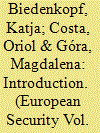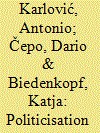|
|
|
Sort Order |
|
|
|
Items / Page
|
|
|
|
|
|
|
| Srl | Item |
| 1 |
ID:
180557


|
|
|
|
|
| Summary/Abstract |
Contestation and politicisation are two concepts of increasing relevance to European foreign and security policy (CFSP) scholars and practitioners alike. However, reasonable doubts can be raised as regards this growing literature: first, political conflict has always been part of CFSP, and national and European politics have traditionally been at the centre of research in this field. Second, exploring how the two concepts relate to European foreign, security and defence policies is complicated by the fact that foreign affairs more broadly do not meet all the criteria set by the literature on politicisation, which usually requires that some form of mass mobilisation takes place, or at least a high degree of salience. This article addresses these concerns by looking at the changing politics of CFSP. As the introduction to the special issue, we explore the hypothesis that contestation of European foreign, security and defence policy is now more in line with the broader way in which political conflict is being re-structured in Europe. If this is so, political conflict over CFSP will more easily be associated with issues that have an appeal beyond the narrow community of its practitioners and observers.
|
|
|
|
|
|
|
|
|
|
|
|
|
|
|
|
| 2 |
ID:
180558


|
|
|
|
|
| Summary/Abstract |
This paper examines the response of the members of the European Council towards the EU’s sanctions policy against Russia following the 2014 Russian occupation and annexation of Crimea and the continued Ukraine crisis. The case is analysed to answer the question on the traits of the politicisation of the EU’s Russia sanctions policy. Concretely, the main research question is: what does the interplay of actor range, salience, and polarisation tell us about politicisation of CFSP in the case of sanctions policy? The secondary research question deals with how actors interact when contesting a sanctions policy to boost their success. Considering that the European Council, as the main actor in CFSP, is something of a “black box”, the paper heuristically focuses on statements (N = 223) on the sanctions policy given by its members from March 2014 till the end of 2019. The analysis shows how the politicisation of the sanctions policy seemingly entrenched itself into EUFP politics after it skyrocketed and fell in the wake of Russia’s annexation of Crimea. Finally, a latent class analysis indicates the existence of two latent coalitions with opposing views on the sanctions policy.
|
|
|
|
|
|
|
|
|
|
|
|
|
|
|
|
|
|
|
|
|